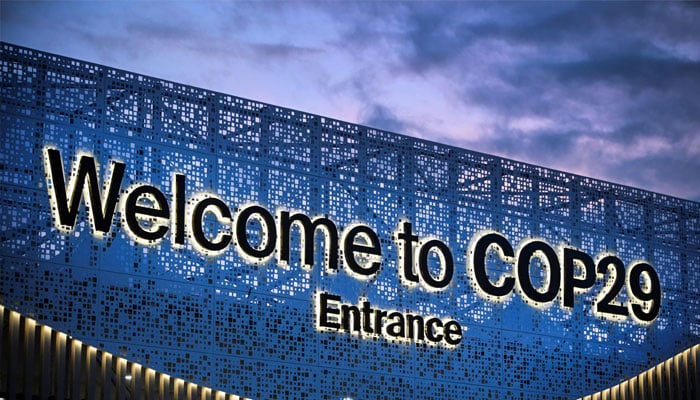A disappointing deal
At COP28, enthusiasm for transitioning away from fossil fuels was notably absent among wealthier nations
The cheers and applause of representatives from developed nations drowned out the sounds of protest as COP29 President Mukhtar Babayev concluded the summit with a declaration hailing a $300 billion climate finance deal as a success. At first glance, this seems like a win – developing nations managed to triple the $100 billion funding promised in earlier agreements. However, given the apocalyptic challenges poor nations have faced in recent years, this deal appears more like a facade for the rich world to shirk its climate responsibilities. The last two climate conferences have starkly highlighted the indifference of developed nations towards the plight of poorer countries. At COP28, enthusiasm for transitioning away from fossil fuels was notably absent among wealthier nations. Their disproportionately larger share of carbon emissions remains an unfortunate reality, which only fueled the anger of developing countries upon learning how little the developed world contributes to the climate fund meant to help poorer nations cope with climate change-induced disasters. Oxfam’s recently released report underscores the scale of this disparity, noting that “the emissions of the world’s super-rich 1.0 per cent are causing economic losses of trillions of dollars; contributing to huge crop losses; and leading to millions of excess deaths.” Yet, the super-rich continue to show little interest in supporting the developing world.
For Pakistan, the outlook is equally grim. As a developing nation, Pakistan contributes less than 1.0 per cent to global carbon emissions, yet it ranks as the seventh most vulnerable country to climate change. In 2022, catastrophic floods submerged a third of the country, causing massive destruction, loss of lives, and widespread displacement. Even now, many of those affected have not been able to rebuild their lives. What Pakistan and countries like it seek from wealthy nations is unconditional climate funding – not loans. But developed nations remain fixated on viewing climate finance as investments that must yield returns. Amid this bleak scenario, Pakistan found a sliver of hope in the adoption of its carbon market policy. During the COP29 sidelines, Coordinator to the Prime Minister on Climate Change Romina Khurshid Alam emphasised Pakistan’s readiness to lead and innovate, highlighting the country’s willingness to collaborate with private-sector stakeholders and international partners to develop carbon markets capable of attracting green investments. This initiative, she noted, aligns with Pakistan’s commitments under the Paris Agreement.
The policy has the potential to channel investments into green projects that help other countries offset their emissions while providing Pakistan some much-needed breathing room. However, experts caution that Pakistan’s Nationally Determined Contributions (NDCs) hinge on an overly optimistic economic growth rate of over 8.0 per cent, which needs to be adjusted to realistic levels. The government must prioritise transitioning to renewable energy, working closely with the private sector to ensure a smooth shift. Meanwhile, regulations to curb greenhouse gas emissions from industrial and agricultural sectors are also urgently needed. While foreign aid might seem like a stopgap solution, it is not a sustainable one. Pakistan must focus on developing a home-grown climate strategy that addresses its unique vulnerabilities and paves the way for long-term resilience against climate change.
-
 Jennifer Hudson Gets Candid About Kelly Clarkson Calling It Day From Her Show
Jennifer Hudson Gets Candid About Kelly Clarkson Calling It Day From Her Show -
 Shamed Andrew Was With Jeffrey Epstein Night Of Virginia Giuffre Assault
Shamed Andrew Was With Jeffrey Epstein Night Of Virginia Giuffre Assault -
 Shamed Andrew’s Finances Predicted As King ‘will Not Leave Him Alone’
Shamed Andrew’s Finances Predicted As King ‘will Not Leave Him Alone’ -
 Bad Bunny Faces Major Rumour About Personal Life Ahead Of Super Bowl Performance
Bad Bunny Faces Major Rumour About Personal Life Ahead Of Super Bowl Performance -
 Sarah Ferguson’s Links To Jeffrey Epstein Get More Entangled As Expert Talks Of A Testimony Call
Sarah Ferguson’s Links To Jeffrey Epstein Get More Entangled As Expert Talks Of A Testimony Call -
 France Opens Probe Against Former Minister Lang After Epstein File Dump
France Opens Probe Against Former Minister Lang After Epstein File Dump -
 Last Part Of Lil Jon Statement On Son's Death Melts Hearts, Police Suggest Mental Health Issues
Last Part Of Lil Jon Statement On Son's Death Melts Hearts, Police Suggest Mental Health Issues -
 Leonardo DiCaprio's Girlfriend Vittoria Ceretti Given 'greatest Honor Of Her Life'
Leonardo DiCaprio's Girlfriend Vittoria Ceretti Given 'greatest Honor Of Her Life' -
 Beatrice, Eugenie’s Reaction Comes Out After Epstein Files Expose Their Personal Lives Even More
Beatrice, Eugenie’s Reaction Comes Out After Epstein Files Expose Their Personal Lives Even More -
 Will Smith Couldn't Make This Dog Part Of His Family: Here's Why
Will Smith Couldn't Make This Dog Part Of His Family: Here's Why -
 Kylie Jenner In Full Nesting Mode With Timothee Chalamet: ‘Pregnancy No Surprise Now’
Kylie Jenner In Full Nesting Mode With Timothee Chalamet: ‘Pregnancy No Surprise Now’ -
 Laura Dern Reflects On Being Rejected Due To Something She Can't Help
Laura Dern Reflects On Being Rejected Due To Something She Can't Help -
 HBO Axed Naomi Watts's 'Game Of Thrones' Sequel For This Reason
HBO Axed Naomi Watts's 'Game Of Thrones' Sequel For This Reason -
 King Charles' Sandringham Estate Gets 'public Safety Message' After Andrew Move
King Charles' Sandringham Estate Gets 'public Safety Message' After Andrew Move -
 Lewis Capaldi Sends Taylor Swift Sweet Message After 'Opalite' Video Role
Lewis Capaldi Sends Taylor Swift Sweet Message After 'Opalite' Video Role -
 Brooklyn Beckham Plunges Victoria, David Beckham Into Marital Woes: ‘They’re Exhausted As It Seeps Into Marriage
Brooklyn Beckham Plunges Victoria, David Beckham Into Marital Woes: ‘They’re Exhausted As It Seeps Into Marriage




